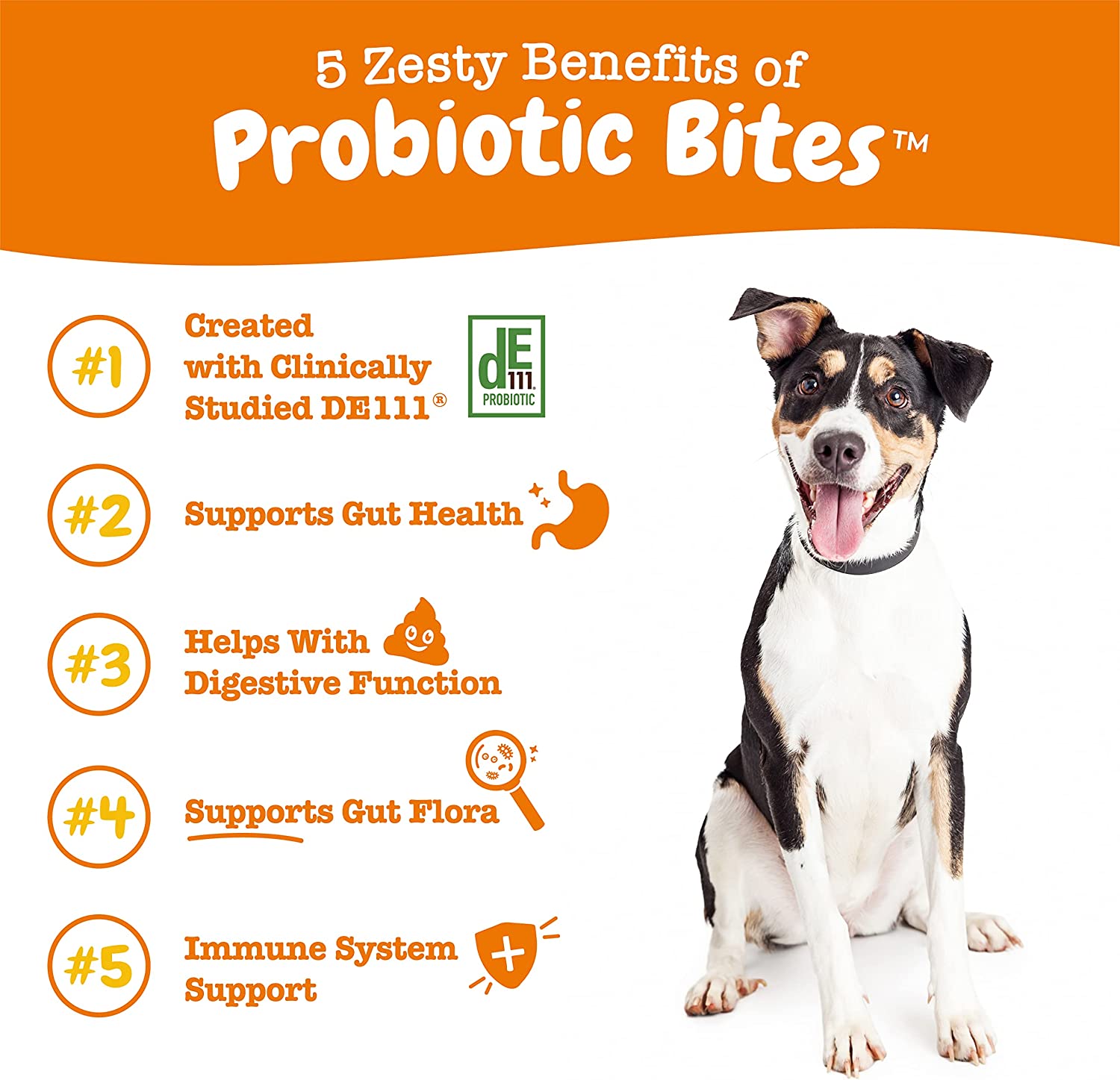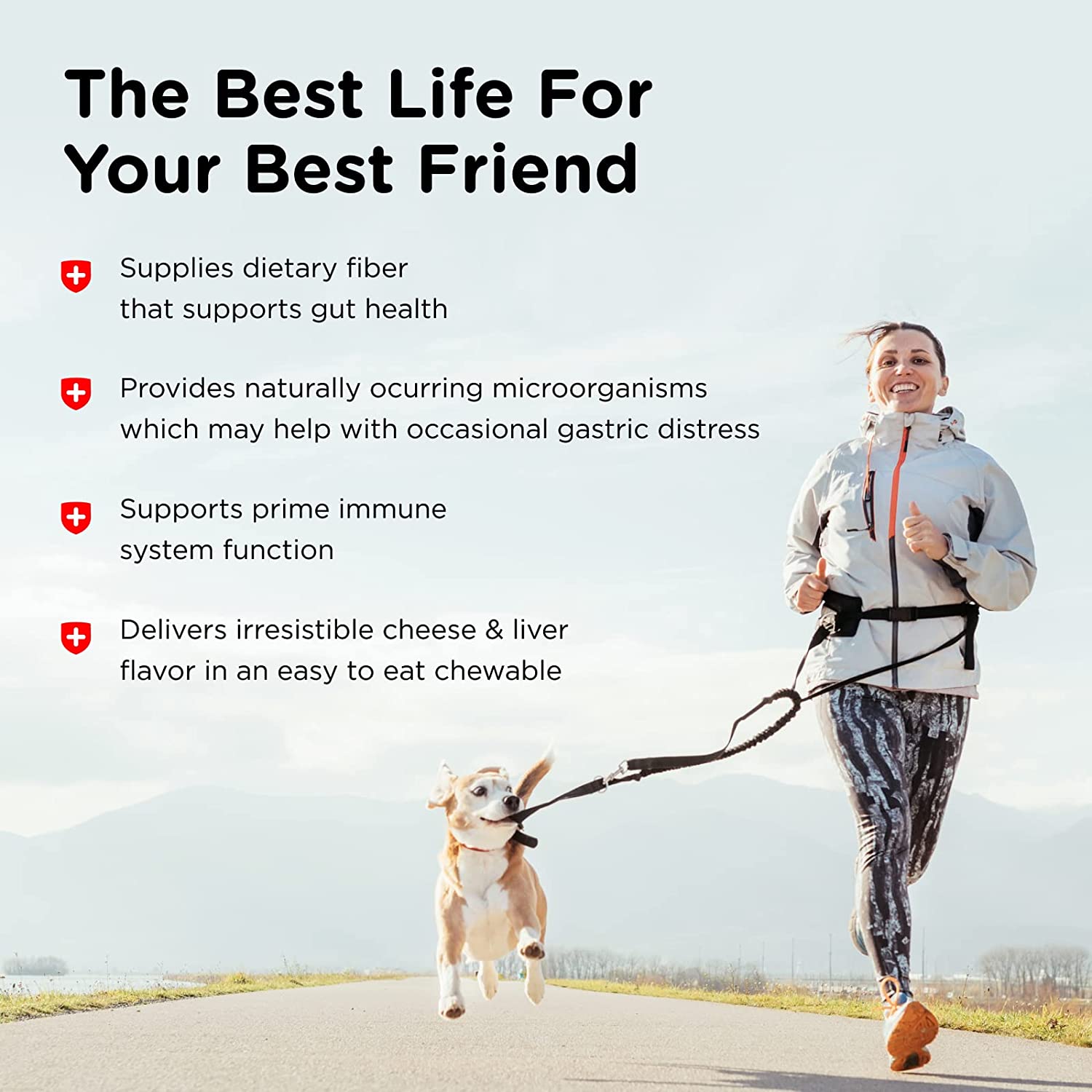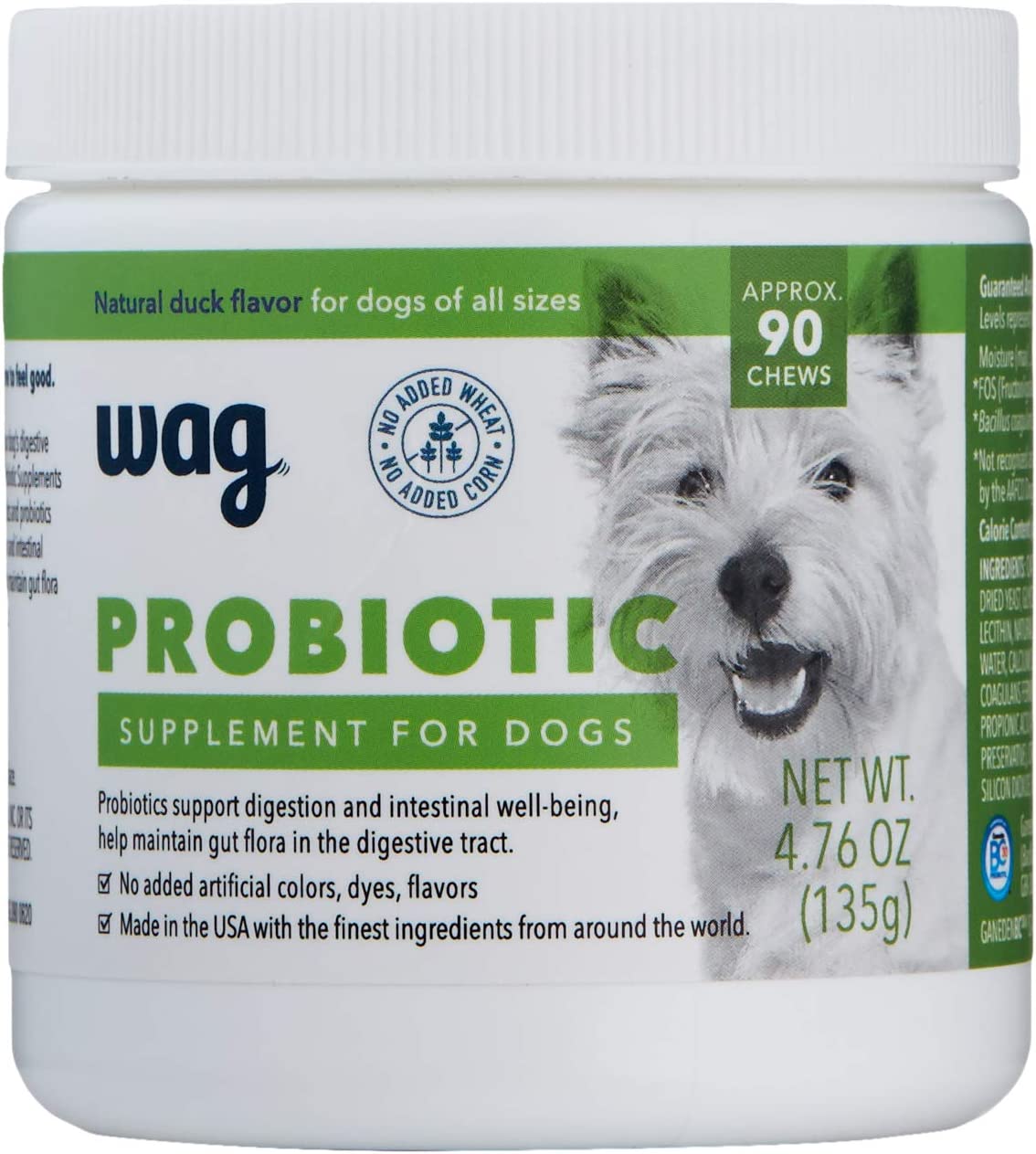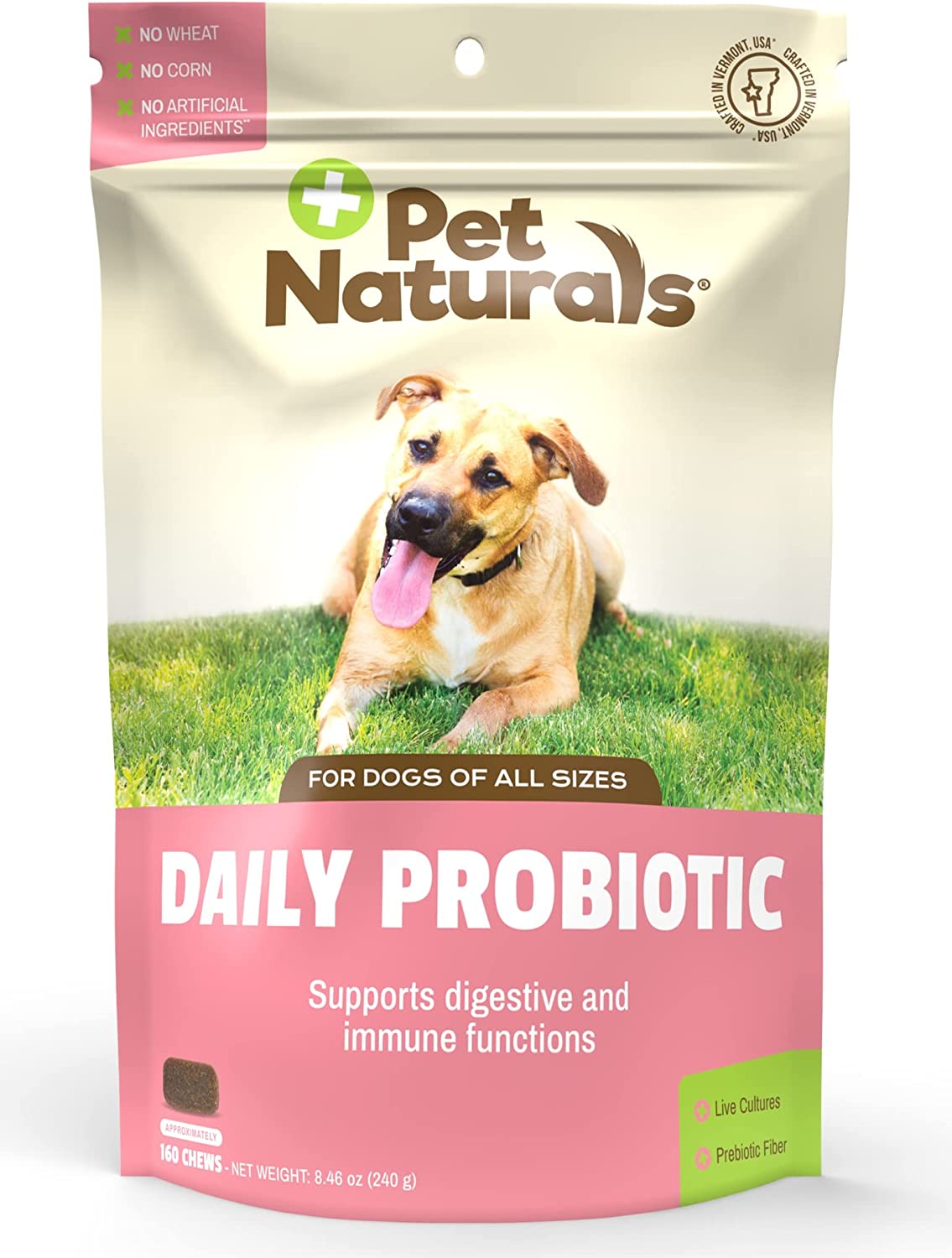There's no doubt about it: dogs tend to be a little more susceptible to digestive issues than humans are. While this may seem like it's all in their heads, the fact is that bacteria and parasites can have a real impact on your pup's gut health — and even his moods.
While probiotics for humans target the gastrointestinal tract directly, probiotic supplements for dogs do so indirectly by supporting healthy digestion with prebiotics and enzymes. This helps balance out the microbiome, protecting against food sensitivities, gas, bloating, constipation, diarrhea, and other symptoms of an out-of-whack gut microbiota. Plus, many canine probiotic supplements also contain additional ingredients like antioxidants or soothing botanicals that aid in digestion while also calming down upset stomachs.
If you're ready to give your furry friend some extra support when it comes to feeling his best inside and out, check out our selection of dog probiotics today!
How We Choose
We first looked at a variety of different factors, including the type of bacteria contained in the probiotic (bacterial strains found in healthy dogs), as well as customer reviews and expert opinions. We also made sure to find brands that are specifically designed for dogs, since there are differences between human and canine probiotics. With all of this information gathered, we were able to narrow down our list to only the absolute best dog probiotics on the market.
Zesty Paws Probiotics for Dogs

The Zesty Paws Probiotics for Dogs are a great choice if you're looking for a probiotic supplement that's easy to administer and designed specifically for dogs. These chewable tablets contain six different strains of probiotic bacteria, including lactobacillus acidophilus, Lactobacillus plantarum, Lactococcus brevis, Leuconostoc citreum, Lactobacillus fermentum and Streptococcus salivarius.
The digestive enzymes in the product help to break down food particles so your dog can get the most out of their meal. The DE111 strain of Bacillus subtilis is also included, which has been clinically studied and shown to support proper digestive function and immune system health. The chewables are made with pumpkin and papaya enzymes to provide additional support for occasional gastrointestinal distress (constipation or diarrhea).
They do have a strong taste, but it's not overpowering or unpleasant. If you're looking for an all-in-one probiotic supplement that's easy to administer and effective at supporting gut flora - these are worth checking out!
Nutri-Vet Pre and Probiotic Soft Chews for Dogs

The Nutri-Vetic Probiotic Dog Chews are a great way to provide your dog with the benefits of probiotics without having to give them pills. These chews come in a variety of flavors, including liver and cheese, and they're made with high-quality ingredients that are safe and beneficial for dogs.
They contain 1 billion CFUs of live, beneficial bacteria cultures, which helps support their digestive health. They also help stimulate growth of these bacteria in the digestive tract, so you can feel good about giving them something that will help keep things moving along smoothly down there. The chews taste great too, so even if your pup doesn't love eating them straight from the package they'll at least enjoy the flavor when they're done chewing them up.
They also offer a wide range of benefits including supporting healthy digestion, promoting proper stool quality and helping to prevent occasional flatulence. They're not just for large breeds either - we've seen smaller dogs happily munching away on these as well.
Wag Probiotic Supplement Chews for Dogs

Wag Probiotic Chews are a great option for those looking for a high quality supplement that contains both prebiotics and probiotics. These chews are made with 100% natural ingredients, including freeze-dried pure cultures of bacteria, which help to support digestive health in dogs.
Each chew contains 90 billion live microorganisms per serving, which is ideal for providing your dog with the right amount of support. They have been designed to be gentle on teeth and gums, making them suitable for all breeds and ages of dogs. The Wag brand has been around since 1999, so you can trust that their products are top quality.
These chews can be given daily as part of a healthy diet and lifestyle plan, or they can be used if your dog experiences occasional bloating or diarrhea-like symptoms. They're also safe to give to pregnant or nursing dogs without any concerns about harm to the baby or mother animal.
Pet Naturals Daily Probiotic for Dogs

It's a good thing that Pet Natural's Daily Probiotic is made in the USA, because it's packed with 100 million live cultures. That means this chew toy will keep your dog happy and healthy.
The duck flavor is designed to soothe upset tummies, and the probiotics work to keep your pup regular. It may not be suitable for all dogs, though. If you have an active chewer, this product may not last long enough for them to get into trouble with it.
However, if your dog likes to sit quietly on the couch while you're watching TV or reading a book together - they'll love having something fun to gnaw on at their side!
Native Pet Probiotic for Dogs

The Native Pet Probiotic for Dogs is a great choice if you're looking for a probiotic supplement that's easy to use and effective. This dog probiotic powder comes with an impressive guarantee, so you can rest assured knowing that it works.
The product uses only four ingredients: a probiotic blend, Jerusalem artichoke extract, pumpkin seed extract, and bone broth as prebiotics. The result? A high-quality supplement that helps keep your pooch healthy and happy! We love the fact that this product is made in the USA – another reason we love Native Pet.
We also appreciate the risk-free guarantee; no questions asked if it doesn't work for your dog - just send it back and get refunded!
Dog Probiotics FAQs
You love your dog and want to give them the best probiotics possible, but with all the different probiotic brands and types out there, it can be hard to know where to start.
Plus, you have questions about probiotics for your furry friend. We've put together a list of the most Frequently Asked Questions about probiotics to help you make an informed decision when buying one for your dog.
Should You Give Your Dog Probiotics?
There might be several reasons why you want to give your dog probiotics: he may have an underlying medical condition such as diarrhea or irritable bowel syndrome, his diet may not be balanced, or he may simply need a nutritional boost.
Some experts believe dogs can benefit from probiotic supplements in the same way humans can, but other feel it only offers benefits to dogs with specific conditions. It's important to discuss this with your veterinarian first to make sure it's the right choice for your pet.
As well as taking a supplement directly, you can also increase the number of probiotics in your dog's diet by adding food containing prebiotics (the type of fiber that feeds probiotics). These include bananas, whole grains and lentils.
Do Vets Recommend Probiotics For Dogs?
The short answer is yes. Most vets recommend probiotics for dogs when they're being given antibiotics, especially for dogs with compromised immune systems.
Probiotics can also be used to treat your dog's diarrhea if it's caused by a bacterial infection and not a dietary sensitivity or an irritant like excess fiber. And similar to humans, probiotics may help dogs who suffer from gas and other digestive issues after eating certain types of food or undergoing certain medical procedures.
When choosing which probiotic to give your pooch, consult with your veterinarian about the best type of supplement based on the specific needs of your pet.
Is It OK To Give Dogs Probiotics Every Day?
While probiotics are generally safe for dogs, as with any supplement, you should consult your veterinarian first to make sure they're appropriate for your pet. Most veterinarians recommend giving probiotics every day to dogs that have a history of digestive problems or whose diet is deficient in the nutrients the bacteria thrive on.
Just like humans, pets can become immune to probiotic effects over time, so it's important to rotate different kinds and brands every few months. Dogs can also experience upset stomach after taking probiotics if they receive them too close to a meal or another form of fiber. Always check with your veterinarian before administering additional fiber with psyllium husk powder or an insoluble fiber laxative.
What Is A Good Probiotic For Gut Health For Dogs?
The best probiotic for dogs will be a veterinary-grade product specifically designed for canine health. Most dog probiotics are dairy-based and contain live active cultures to restore balance in the digestive system.
The most common reasons for prescribing a probiotic include diarrhea, constipation, irritable bowel syndrome (IBS), and an imbalance of bacteria in the intestinal tract (dysbiosis).
Most pet owners only need to give their dog supplemental probiotics when they experience some form of stomach upset or if they're given antibiotics. Veterinarians often recommend yogurt as a good source of live cultures but remember that many dogs don't like the taste so you may need to hide it inside their regular food or treats.
Is Pumpkin A Probiotic For Dogs?
The short answer is yes, pumpkin can be a probiotic for dogs. However, it's not something that most vets recommend because pumpkin isn't particularly nutritious and could lead to constipation if your dog has this condition.
It's better to look for other probiotics specifically designed for dogs such as the ones found in some pet food brands like Purina Pro Plan. The reason why pumpkin can act as a probiotic is because it contains fiber which feeds the good bacteria in your dog's digestive system.
Do Probiotics Help Itchy Dogs?
The short answer is yes, probiotics can be very helpful for dogs with itching and skin allergies.
Dogs with chronic itching are often diagnosed with having an underlying skin allergy. This means that the dog's immune system is producing an overabundance of histamine (which causes inflammation and discomfort). The best way to treat this type of allergic response is by administering a hypoallergenic diet which only contains ingredients that your dog isn't allergic to. However, many dogs don't do well on these diets because they lack important nutrients.
That's where probiotics come into play: They help dogs maintain a healthy digestive tract so they can absorb all the nutrients in their food. Probiotics also help promote intestinal health which improves overall health and wellbeing in dogs, including those who have itchy skin or other allergies.
Is Greek Yogurt A Good Probiotic For Dogs?
Dogs have different nutritional needs than humans, so it's important to choose the right type of food for your four-legged companion. While yogurt is certainly nutritious for humans, a lot of human yogurts contain nutrients that aren't good for dogs. For example, a lot of commercial yogurts contain high amounts of lactose and some even include added sugar.
Greek yogurt is considered one of the best yogurts for dogs because it contains less lactose and no added sugars. It also contains more protein compared to regular dairy or non-dairy alternatives like almond milk or coconut milk.
When choosing Greek yogurt as a probiotic source, you'll want to make sure it has live cultures such as Lactobacillus acidophilus and Bifidobacterium animalis (these are two strains specifically recommended by veterinarians). Some brands may list these strains in their product descriptions online or on their packaging. You can also check with your veterinarian about specific brands they recommend based on your dog's health issues and other dietary needs.
How Long Should A Dog Be On Probiotics?
Generally speaking, probiotics can be taken in the long term to help support healthy digestion. However, it's best to consult your veterinarian about how often and for how long your dog should take probiotics.
Depending on your dog's needs, a veterinarian may advise that you give probiotics once a week or every day. If your dog is recovering from an illness – such as an antibiotic-related diarrhea episode – then he may need to continue taking probiotics for several weeks or months afterwards.
It's also important to note that some dogs are lactose intolerant, so it may not be appropriate for them to take regular canine probiotic capsules containing live cultures of dairy bacteria. In this case, speak with your veterinarian about suitable alternatives (such as non-dairy based capsules).
Can Probiotics Have Side Effects In Dogs?
While it's true that probiotics are generally very safe for dogs, some side effects can occur. If you notice any of the following symptoms, stop giving your dog probiotics and contact your veterinarian immediately:
Diarrhea or gas (flatulence) in dogs
Excessive thirst in dogs Dog constipation may be a symptom of too many probiotics as well as an imbalance of other essential nutrients. Monitor your pet carefully for signs of constipation and consult with a vet if it persists.
What Time Of Day Should I Give My Dog Probiotics?
Dogs can have their probiotic supplements with any kind of food, but it's best to give them at a specific time. This will help your dog remember that it needs to be taken. If you want to actually boost the benefits of the probiotic, though, you need to give it during a specific part of the day and in conjunction with a meal. Studies show that dogs are able to properly digest food when given probiotics two hours before or one hour after eating.
This means your dog should get its supplement either two hours before breakfast, lunch and dinner or an hour before each meal. You should also make sure your pet gets plenty of water when taking probiotics so they don't get constipated or develop an intestinal blockage.
Conclusion
As we have seen, there are many factors to consider when selecting the ideal dog probiotics. These include species and strain of bacteria, dosage instructions, storage conditions, price point, and customer reviews. The best dog probiotics should be safe for dogs of all ages and sizes, have beneficial effects on digestion and immune function, come from high-quality sources with clinical evidence of effectiveness, and offer value for money compared to other products on the market. By taking into account these different criteria when making their choice customers can find an excellent product that meets their needs without breaking the bank. With careful consideration of all these elements pet owners can keep their furry friends healthy while staying within budget!









